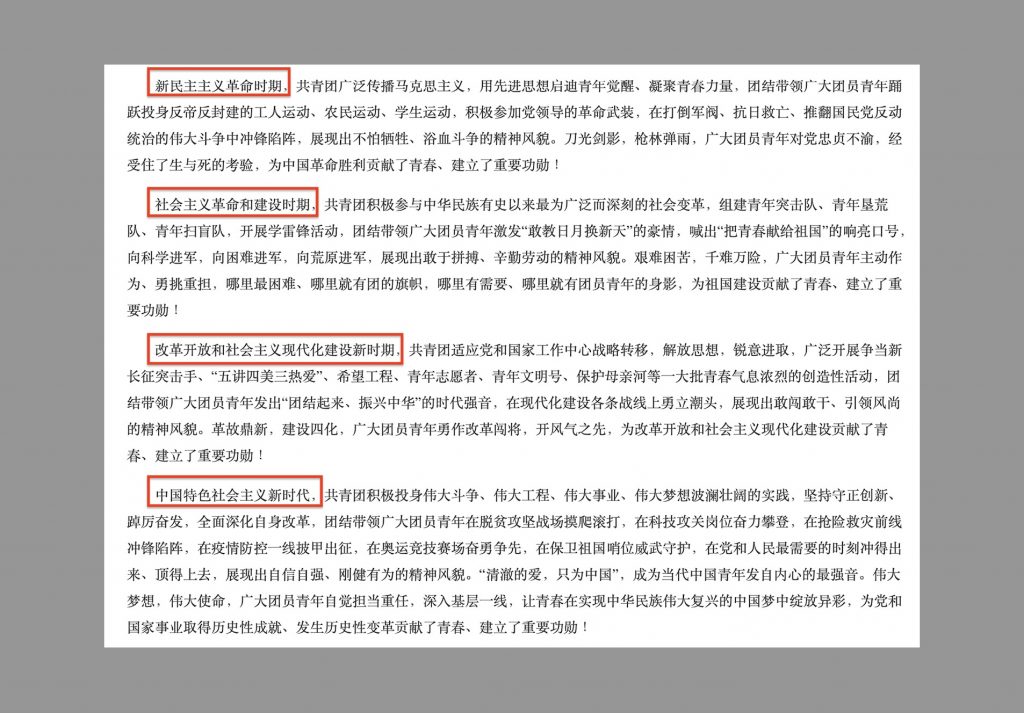
At right, Zhu De (朱德) and Liao Chengzhi (廖承志) on the podium while attending China’s Second National Youth League Congress on July 1, 1953. Reform leader Hu Yaobang (胡耀邦), who was leader of the Communist Youth League from 1952 to 1966, is on the left. Image in Public Domain available at Wikimedia Commons.
In a speech this week marking the centenary of the Chinese Communist Youth League, the country’s official youth movement, Xi Jinping emphasized that it was the league’s mission to “go unswervingly with the Party.” To this end, he said, the league must “persist in grooming [young] people for the Party,” ensuring the loyalty and dedication of the next generation.
But even as the Party’s general secretary sought to inspire youth leaders with the past, recalling Mao Zedong’s words about the youth “spirit of struggle” (斗争精神), he sought to shape the dominant view of the history to firm up the foundation of his power.
When Xi Jinping reaches the section in his speech summing up the history of the CCP over the past century, he neatly outlines four distinct stages. While the first three, spanning the rule of Mao Zedong and reform and opening, are introduced as “periods,” the last, demarking Xi’s own rule, is referred to as the “New Era.”

The difference between the “period,” or shiqi (时期), and the “era,” or shidai (时代), might seem incidental at first. But the two are markedly different. In English, the word “era” has a clearer sense of denoting a period of time as being in some sense momentous, and in Chinese this sense is further deepened. A period is a calendar page. An era is an epic scroll painting.
Xi Jinping’s retelling of history for China’s youth, mirroring the interpretation given in the November 2021 resolution, refers to the first period as that of the New Democratic Revolution (新民主主义革命), covering the Chinese Civil War from the 1920s up to the founding of the People’s Republic of China. The second period is that of “socialist revolution and construction” (社会主义革命和建设), covering the time from the founding of the PRC up to the Third Plenum of the 11th CCP Central Committee in 1978, which marked the start of the reform and opening policy.
The third period, that of “reform and opening and socialist modernization construction” (改革开放和社会主义现代化建设), is a storage bin Xi Jinping uses to pack away the achievements of all three of his post-Mao predecessors, Deng Xiaoping, Jiang Zemin and Hu Jintao. No longer is Deng singled out as an inspirational leader, the architect of reforms. To appropriate Deng’s own words, he is but one of several stones used to cross the river. And on the other side lies the promised land of Xi’s era, the “New Era of Socialism With Chinese Characteristics” (中国特色社会主义新时代), a phrasing that simultaneously invokes Xi’s banner term. This is essentially an act of self-crowning, in which the general secretary asserts his dominance not just over any current rivals, but also claims himself as a culmination of China’s modern political history.
A great dream, a great mission, and the masses of youth members have taken up the great responsibility going deeper into the grassroots on the front line. The youth have blossomed into the dream of the great rejuvenation of the Chinese people.
There are nine references in all in the speech to the “New Era,” all but one of these coming in the final section. Several are references to the “Chinese youth of the New Era” (新时代中国青少年), a phrase that neatly braids together Xi’s personal ambitions and the Party’s future. At one point, Xi even references the phrase guozhidazhe (国之大者), which can be translated “matters of national importance,” but can also be taken ambiguously as a reference to Xi himself as the big man.
“The Communist Youth League should unite and lead the youth to be the tide of the New Era, consciously heeding the call of the Party and the people,” he says, “with the ‘matters of national importance’ in mind, taking up the mission and the task, reaching the new horizon of the New Era, where they can realize their ambitions.”
In sum, the future of China’s youth is certainly to be grasped by the youth. But it is first and foremost a matter to be decided by the Party under Xi’s leadership.




















